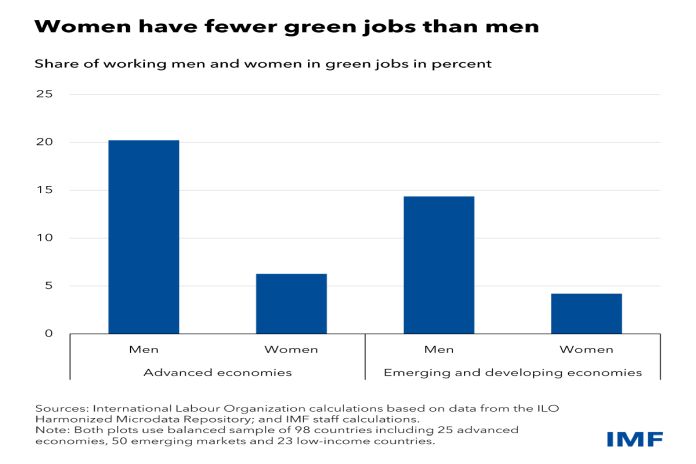- Closing the gender gap in science, technology, engineering, and math would accelerate the green transition while making it more inclusive
By Stefania Fabrizio, Florence Jaumotte, and Marina M. Tavares
Men hold about 70 percent of the world’s polluting jobs, so one might think that they have most to lose from the transition to cleaner energy. After all, they risk finding themselves out of work as countries close down dirty industries in a push to decarbonize and reach net-zero emission targets.
Yet our analysis shows that women are also at risk of losing out over the course of the transition. That’s because too few women study the science, technology, engineering, and mathematics (STEM) subjects that are vital to the green jobs of the future.
Women are much more underrepresented in green jobs, which improve environmental sustainability or reduce greenhouse gas emissions, than in polluting jobs, those in industries with per-worker emissions in the top five percent of polluters. While most workers work in neutral jobs, that gap is important because green jobs, which already employ one in ten workers, are poised for much faster employment growth as the world shifts toward a sustainable economy.
For example, just 6 percent of women who work in advanced economies hold green jobs, compared to over 20 percent of working men. Green jobs employ an even lower share of women in emerging market and developing economies.
This is significant because green jobs command a substantial wage premium over other jobs in the economy, even after accounting for workers’ education and experience, as our calculations based on several representative countries show.
In Colombia, for example, the wage premium is 9 percent for men and 16 percent for women. This wage premium highlights another reason women stand to lose out: they may be missing out on higher-paying opportunities.
The gender gap in STEM education is one of the biggest barriers to women getting green jobs. These skills are essential for engineering, renewable energy, and technology sectors that drive innovation. But women remain underrepresented in STEM fields despite making significant progress in higher education.
Women account for less than a third of STEM graduates in many countries, leaving them less prepared for green jobs that will shape the future labor market. Without targeted efforts to increase such participation, the green transition may worsen workforce gender inequality.
Addressing the underrepresentation of women in green jobs has significant economic and environmental consequences. Countries with a bigger share of STEM-educated workers and stronger gender equality policies tend to have steeper reductions in greenhouse gas emissions in response to climate policies. Emissions intensity in these countries is 2 to 4 percentage points lower, our research shows. STEM education drives green innovation and gives workers the skills they need for green jobs.
Policymakers should lower these barriers by giving women incentives for STEM education and ensuring equal access to green jobs. This includes early STEM exposure, mentorship, and public-private partnerships.
Ireland, for example, tripled its share of young women earning STEM degrees in the space of eight years by integrating STEM subjects across all education levels, with a focus on early education for girls, in addition to adopting gender-focused curricula and providing specialized training for educators.
In addition, policymakers should support women’s participation in the economy by reducing labor market barriers, improving access to finance, reforming legal frameworks, and increasing board representation. This will make the green transition more inclusive and improve the effectiveness of climate policies.
The road to a sustainable economy must be paved with inclusivity. The more that both women and men can contribute to, and benefit from, the green transition, the better off we’ll all be.





